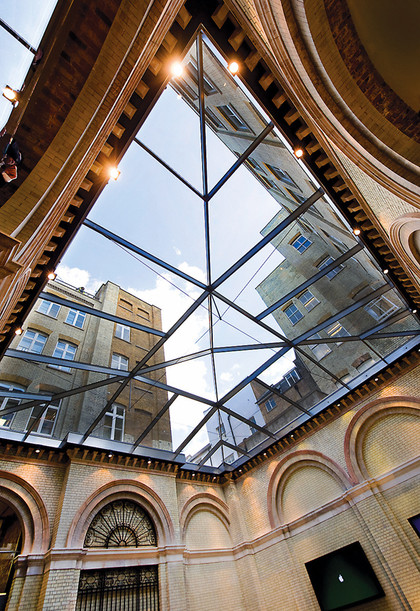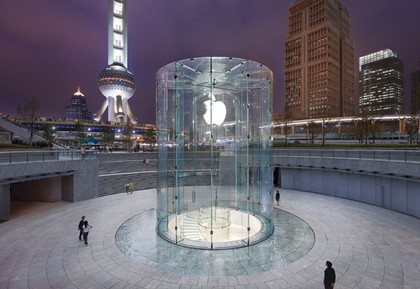How Apple became a retail giant
In just over a decade, Apple Stores have become regular features in our cities

Perhaps surprisingly, Apple's first store in Paris (there are now four in the area, with eight in France overall) didn't arrive until 2009. But what a location: it's in the Louvre, one of the most respected cultural institutions in the world.
"We build a lot of stores, but we do a few that are really special, and the significant stores tend to have a landmark location and really unique architecture. And you put that together and it kind of becomes magical," said Johnson, speaking at its launch.
It's a beautifully designed location, fully deserving of its premier position inside the Louvre's underground shopping mall and within glancing distance of the famous Pyramide Inversée which visually defines the Louvre itself.
Looking through the glass inside the store, you begin to notice that the entire ceiling of the store features diamond-shaped metal panels that reflect the design of the famous Pyramid. It really is a sight to behold.
Apple's other Paris store of note is in the Opéra district, noted for its 'Grands Boulevards' (large avenues) built by Baron Haussmann under Napoleon III, to give the capital city more prestige. As its name implies, at the heart of the Opéra district you'll find the world-famous Opera Garnier, built in 1860 - one of the world's most renowned opera houses.
The Apple Store here is on three floors. The building formerly housed the Bank of Italy, and Apple's architects have done an amazing job of preserving the old infrastructure, right down to the door of the original safe.
In the basement, where said safe was located and which is now the accessories room, the mosaics on the floor and on the wall at the entrance have also been preserved. This store is perhaps Apple's best restoration job. There are so many little details to wonder at, such as the brass grates at the centre of the mosaics in the floor on the downstairs level, the huge marble columns, massive windows, the candle-style chandelier lighting, the brass handrails on the stairs. The list just goes on and on - you really could spend a good hour just exploring the architecture.
Get daily insight, inspiration and deals in your inbox
Sign up for breaking news, reviews, opinion, top tech deals, and more.
The mezzanine level, home to the Genius Bar, feels more like a balcony where you look down upon a performance below, and in the basement there are little twists and turns that you wouldn't expect in a normal retail store. As with the Covent Garden store, there's also a skylight, to allow natural light to show off products in their full glory.
The final Apple Store that's worthy of a mention is the Pudong store in Shanghai, which opened in July 2010. Like the 5th Avenue store in Manhattan, this is an underground structure with only glass visible above ground. But instead of the famous cube, a 30-foot high cylindrical glass entrance marks the spot - the largest single piece of glass ever constructed.
The perimeter of the glass tower is almost completely surrounded by a shallow water fountain, leaving only a gap for entry down into the store via a spiral glass staircase. The store sits beneath a circular plaza at the International Finance Centre in the Lujiazui financial district of the city, at the base of two glass skyscrapers over 300m tall.
One skyscraper contains office space and the other houses the Ritz-Carlton Hotel. Both were designed by the famous Argentine architect César Pelli.
Faking it

Such is the cachet associated with the Apple brand these days, in fact, that scammers aren't content to simply fake Apple products any more - they're taking the counterfeiting to whole new levels by setting up entire fake stores.
This was brought to light in spectacular fashion earlier this year, when several fake Apple stores were discovered to be operating in China. In fact, it's not a new phenomenon; China is notoriously rife with fake products and services of all kinds, and local authorities are lax when it comes to enforcing regulations.
What makes the outlet in the south-western city of Kunming stand out, however, is the sheer lengths which the scammers have gone to create the impression of a real Apple store. From the glass exterior, display tables, spiral staircase and (genuine) promotional posters, to the T-shirts worn by the staff, such care and attention has been put in that you wonder why their talents haven't been put to better use elsewhere.
Compare this to other efforts such as the outlet that proudly announced itself to be an 'Apple Stoer' and it actually starts to seem quite impressive, if still thoroughly illegal. Remarkably, at the time of writing the store in question (along with three others) was still being allowed to operate, for reasons that remain unclear.
So what's next for Apple Stores? Well, they continue to attract admiration and attention - and not always in ways the company itself might approve of.
Take the opening of its latest giant outlet in Hamburg, for example. As is customary, the front of the store was covered by large black hoarding throughout its construction. This obviously acted as a blank canvas for the two pranksters dressed as workmen who, in broad daylight, came along with a ladder, climbed up and calmly pasted a giant Microsoft Windows logo on the side of the hoarding - while filming the whole thing.
Not that such japes are likely to distract Apple. At the time of writing, it had (unconfirmed) plans to open several new stores in the US, France, Spain, the Netherlands, Brazil, Germany, Australia, Ireland and Scotland - with more undoubtedly on the way. In short, Apple is showing no signs of slowing down any time soon.
- 1
- 2
Current page: The art of the Apple Store: special stores
Prev Page The art of the Apple Store: small beginnings
Graham is the Senior Editor for AI at TechRadar. With over 25 years of experience in both online and print journalism, Graham has worked for various market-leading tech brands including Computeractive, PC Pro, iMore, MacFormat, Mac|Life, Maximum PC, and more. He specializes in reporting on everything to do with AI and has appeared on BBC TV shows like BBC One Breakfast and on Radio 4 commenting on the latest trends in tech. Graham has an honors degree in Computer Science and spends his spare time podcasting and blogging.